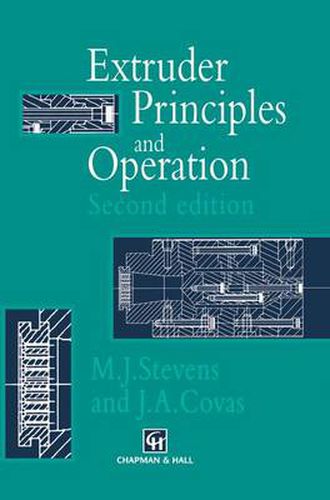Readings Newsletter
Become a Readings Member to make your shopping experience even easier.
Sign in or sign up for free!
You’re not far away from qualifying for FREE standard shipping within Australia
You’ve qualified for FREE standard shipping within Australia
The cart is loading…






This title is printed to order. This book may have been self-published. If so, we cannot guarantee the quality of the content. In the main most books will have gone through the editing process however some may not. We therefore suggest that you be aware of this before ordering this book. If in doubt check either the author or publisher’s details as we are unable to accept any returns unless they are faulty. Please contact us if you have any questions.
This book is intended to fill a gap between the theoretical studies and the practical experience of the processor in the extrusion of thermoplastic polymers. The former have provided a basis for numerical design of extruders and their components, but generally give scant attention to the practical performance, especially to the conflict between production rate and product quality. In practice extruders are frequently purchased to perform a range of duties; even so, the operator may have to use a machine designed for another purpose and not necessarily suitable for the polymer, process or product in hand. The operator’s experience enables him to make good product in unpromising circumstances, but a large number of variables and interactions often give apparently contradictory results. The hope is that this book will provide a logical background, based on both theory and experience, which will help the industrial processor to obtain the best performance from his equipment, to recognize its limitations, and to face new problems with confidence. Mathematics is used only to the extent that it clarifies effects which cannot easily be expressed in words; ifit is passed over, at least a qualitative understanding should remain. The approximate theory will not satisfy the purist, but this seems to the authors less important than a clear representation of the physical mechanisms on which so much of the polymer processing industry depends. M. J. STEVENS J. A.
$9.00 standard shipping within Australia
FREE standard shipping within Australia for orders over $100.00
Express & International shipping calculated at checkout
Stock availability can be subject to change without notice. We recommend calling the shop or contacting our online team to check availability of low stock items. Please see our Shopping Online page for more details.
This title is printed to order. This book may have been self-published. If so, we cannot guarantee the quality of the content. In the main most books will have gone through the editing process however some may not. We therefore suggest that you be aware of this before ordering this book. If in doubt check either the author or publisher’s details as we are unable to accept any returns unless they are faulty. Please contact us if you have any questions.
This book is intended to fill a gap between the theoretical studies and the practical experience of the processor in the extrusion of thermoplastic polymers. The former have provided a basis for numerical design of extruders and their components, but generally give scant attention to the practical performance, especially to the conflict between production rate and product quality. In practice extruders are frequently purchased to perform a range of duties; even so, the operator may have to use a machine designed for another purpose and not necessarily suitable for the polymer, process or product in hand. The operator’s experience enables him to make good product in unpromising circumstances, but a large number of variables and interactions often give apparently contradictory results. The hope is that this book will provide a logical background, based on both theory and experience, which will help the industrial processor to obtain the best performance from his equipment, to recognize its limitations, and to face new problems with confidence. Mathematics is used only to the extent that it clarifies effects which cannot easily be expressed in words; ifit is passed over, at least a qualitative understanding should remain. The approximate theory will not satisfy the purist, but this seems to the authors less important than a clear representation of the physical mechanisms on which so much of the polymer processing industry depends. M. J. STEVENS J. A.